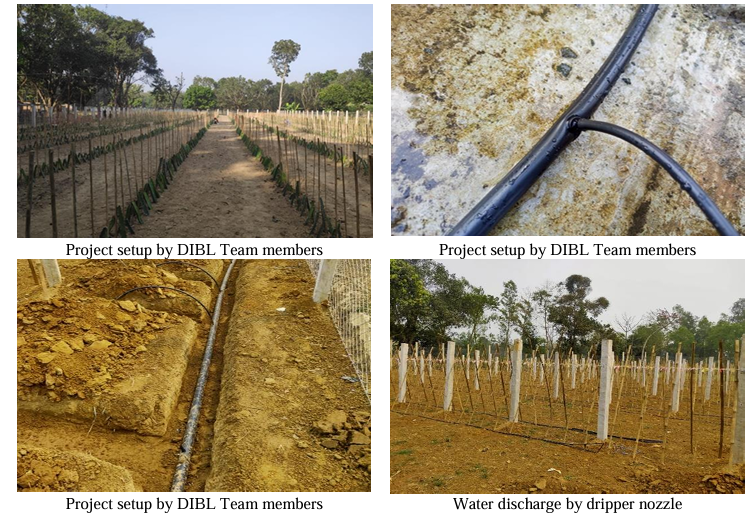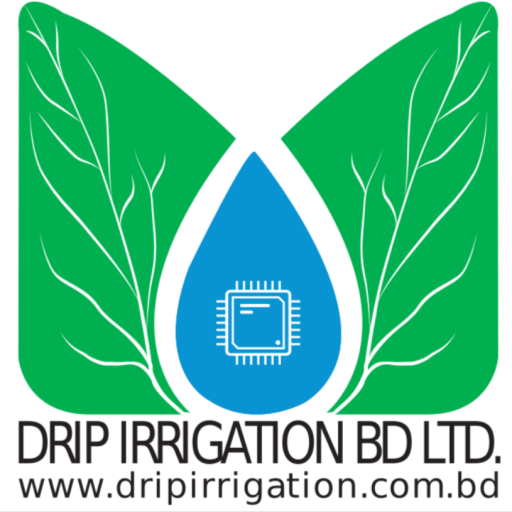Imagine a world where farmers in Bangladesh can cultivate their land with significantly less water, achieve higher yields, and reduce their operational costs. This vision is becoming a reality thanks to innovative irrigation solutions, and at the forefront of this transformation is Drip Irrigation BD Ltd. (DIBL). Recently, our team successfully implemented a new drip irrigation project, a glimpse of which you can see in the images above. This initiative promises to bring substantial changes to the lives of local farmers, addressing crucial challenges related to water scarcity and agricultural productivity.

Project Details:
Overview: This recent project showcases the initial setup of a drip irrigation system implemented by the DIBL team. While the specific location isn’t detailed in the images, it represents our ongoing commitment to bringing efficient irrigation solutions to farms across Bangladesh. The project aims to address the common problem of inefficient water usage in traditional farming practices, which often leads to water wastage and suboptimal crop growth.
Technical Description: The images offer a view into the simplicity and effectiveness of our drip irrigation system. You can see the main pipelines and the strategically placed dripper nozzles designed for precise water delivery directly to the plant roots. One of the key advantages of our system is its user-friendly setup. Farmers can often install it themselves or with the help of a local plumber or technician. Furthermore, our company engineers are always ready to provide support and guidance, ensuring a smooth and hassle-free installation process.
Key Benefits for Farmers & Entrepreneurs:
Water Efficiency: Traditional flood irrigation methods often lead to significant water loss through evaporation and runoff. In contrast, drip irrigation has been scientifically proven to reduce water usage by up to 60% (Source: Various agricultural research journals). Farmers who have adopted our systems frequently share feedback like, “We used to spend hours flooding our fields, and still, some areas wouldn’t get enough water. Now, with drip irrigation, every plant receives the exact amount it needs, saving us time and a lot of water!”
Crop Yield Improvement: By delivering water and nutrients directly to the root zone, drip irrigation optimizes plant growth and significantly increases crop yields. Depending on the crop, farmers have reported yield increases ranging from 20% to 50% (Source: Agricultural extension service reports in similar regions). Crops like mango, vegetables, and various fruit trees particularly benefit from this consistent and targeted watering.
Cost Savings: While the initial investment in a drip irrigation system might seem higher than traditional methods, the long-term cost savings are substantial. Reduced water consumption translates directly to lower water bills or reduced pumping costs. Moreover, the precise application of fertilizers through the drip system (fertigation) minimizes waste and maximizes nutrient uptake, leading to lower fertilizer expenses.
Automation & Smart Features: Our advanced drip irrigation systems can be integrated with timers and even IoT (Internet of Things) devices for automated and remote monitoring. Farmers can set watering schedules based on crop needs and weather conditions, ensuring optimal irrigation even when they are not physically present.
Long-Term Sustainability: Drip irrigation is an environmentally friendly practice. By minimizing water runoff, it helps prevent soil erosion and reduces the leaching of fertilizers and pesticides into groundwater. This contributes to the long-term health and sustainability of the farmland.
Weed Control: The localized application of water in drip irrigation significantly reduces weed growth between rows, as only the areas near the plants receive moisture. This minimizes the need for manual weeding and the use of herbicides, leading to healthier crops and reduced labor costs. Farmers often comment, “We spend so much less time pulling weeds now! The drip lines keep the areas between plants dry, which really helps.”
Time and Labor Savings: The automated nature of drip irrigation, coupled with the reduced need for weeding and manual watering, translates to significant time and labor savings for farmers. This allows them to focus on other important aspects of farm management.
Initial Investment vs. Long-Term Savings: While the upfront cost of installing a drip irrigation system might be a consideration, the long-term benefits far outweigh this initial investment. Consider the story of Mr. Karim from Jashore, who invested in a DIBL drip system for his mango orchard. He initially hesitated due to the cost, but within two seasons, the increased yield and reduced water bills not only recovered his investment but also significantly boosted his profits. He now says, “It was the best decision I ever made for my farm.”
Real-Life Impact & Success Stories:
We’ve witnessed firsthand the transformative impact of our drip irrigation systems on the lives of farmers across Bangladesh. Mr. Rahim from Chattogram, a vegetable farmer, shared, “After installing the DIBL drip system, my vegetable yield increased by almost 40% within three months! I am now earning significantly more and spending much less on water and labor.” These success stories highlight the tangible benefits of adopting innovative irrigation technologies. While specific government incentives may vary, DIBL actively works with farmers to explore available support programs.
Inspiration & Business Opportunities:
The success of projects like the one pictured serves as an inspiration for other farmers and entrepreneurs in Bangladesh. Implementing efficient irrigation systems is not just beneficial for individual farms but also contributes to the overall agricultural sustainability and economic growth of the nation. For aspiring agribusiness startups, the drip irrigation sector offers significant opportunities for innovation and growth, especially in partnership with established companies like Drip Irrigation BD Ltd. (DIBL). We encourage new ventures to explore collaborations and contribute to this vital sector.
Geo-Location Details:
While the exact location of this specific project isn’t shown, DIBL has implemented successful drip irrigation systems in various districts across Bangladesh, including Jashore, Chattogram, Bogura, and Sylhet, demonstrating the adaptability and effectiveness of our solutions in diverse agricultural settings.
Call to Action & Company Contact Details:
Interested in implementing a cost-effective and efficient irrigation system for your farm or business? Contact us today to learn more about how Drip Irrigation BD Ltd. (DIBL) can help you achieve higher yields, save water, and improve your profitability.
Contact Us: Email: [email address removed] Website: www.dripirrigation.com.bd
Head Office: Address: 2C/81, Parijat Apartment, North Adabor, Shyamoli, Dhaka-1207 Phone: 01324-445400 | Email: [email address removed] Representative: Sadman Sarar (Public Relations Officer)
Branches: Dhaka: Phone: 01324-445411 | Email: [email address removed] | Representative: Tanbirul Islam, Assistant Engineer Chattogram: Phone: 01324-445395 | Email: [email address removed] | Representative: Mobinul Islam, Assistant Engineer Bogura: Phone: 01324-445385 | Email: [email address removed] | Representative: Md. Samsuzzaman Sumon, Assistant Director Jashore: Phone: 01324-445390 | Email: [email address removed] | Representative: Md. Masud Rana, Assistant Engineer Sylhet: Phone: +880 1919-751845 | Representative: Asadul Islam Shahoria, Sub-Assistant Engineer
Follow us on: Facebook | YouTube | LinkedIn | Instagram | WhatsApp
Drip Irrigation BD Ltd. (DIBL) | Orenge Corner Graduate | iDEA Portfolio Startup Company © 2025 Drip Irrigation BD Ltd. (DIBL)
{ “@context”: “https://schema.org”, “@type”: “FAQPage”, “mainEntity”: [ { “@type”: “Question”, “name”: “What are the main benefits of using drip irrigation systems in Bangladesh?”, “acceptedAnswer”: { “@type”: “Answer”, “text”: “Drip irrigation offers several key advantages for farmers in Bangladesh, including significantly reduced water usage (up to 60% compared to traditional methods), increased crop yields (ranging from 20% to 50% depending on the crop), lower operational costs due to reduced water and fertilizer consumption, minimized weed growth, and substantial savings in time and labor for irrigation tasks. Additionally, it promotes long-term soil health by preventing erosion and nutrient leaching. Farmers like Mr. Karim from Jashore have experienced firsthand how drip irrigation boosted their mango orchard’s productivity and profitability.” } }, { “@type”: “Question”, “name”: “How easy is it to set up a drip irrigation system from DIBL?”, “acceptedAnswer”: { “@type”: “Answer”, “text”: “Setting up a DIBL drip irrigation system is designed to be straightforward. Many farmers can install it themselves or with the assistance of a local plumber or technician. The system components are user-friendly, and we provide clear instructions and support. Furthermore, our company engineers are always available to offer guidance and technical assistance if any difficulties arise during the installation process. We believe in making this technology accessible to all farmers in Bangladesh.” } }, { “@type”: “Question”, “name”: “Which types of crops benefit the most from drip irrigation?”, “acceptedAnswer”: { “@type”: “Answer”, “text”: “Drip irrigation is beneficial for a wide variety of crops commonly grown in Bangladesh. Some of the crops that show significant improvements in yield and quality with drip irrigation include mangoes, vegetables (such as tomatoes, eggplants, and cucumbers), fruit trees (like lychees and guavas), and other high-value crops. The precise and consistent water delivery caters to the specific needs of these plants, leading to healthier growth and better harvests. Mr. Rahim, a vegetable farmer in Chattogram, reported a 40% increase in his vegetable yield after adopting our drip system.” } }, { “@type”: “Question”, “name”: “Is drip irrigation an expensive investment for small farmers in Bangladesh?”, “acceptedAnswer”: { “@type”: “Answer”, “text”: “While the initial investment in a drip irrigation system might seem higher compared to traditional irrigation methods, it’s crucial to consider the long-term cost savings and increased profitability. Reduced water and fertilizer costs, coupled with higher crop yields, often lead to a quick return on investment. Moreover, the savings in time and labor further contribute to the overall economic benefits. We at DIBL strive to offer cost-effective solutions and work with farmers to explore any available government incentives or subsidies to make drip irrigation more accessible. The story of Mr. Karim in Jashore demonstrates how the long-term gains significantly outweigh the initial cost.” } }, { “@type”: “Question”, “name”: “Does drip irrigation help with weed control and soil health?”, “acceptedAnswer”: { “@type”: “Answer”, “text”: “Yes, drip irrigation plays a significant role in weed control and maintaining soil health. By delivering water directly to the plant roots, the areas between rows remain relatively dry, which inhibits weed germination and growth. This reduces the need for manual weeding and the use of herbicides, leading to healthier crops and a more environmentally friendly farming practice. Furthermore, by minimizing water runoff, drip irrigation helps prevent soil erosion and the leaching of essential nutrients, contributing to the long-term health and fertility of the soil. Farmers have noted a significant reduction in weed-related labor after switching to drip irrigation.” } } ] }

